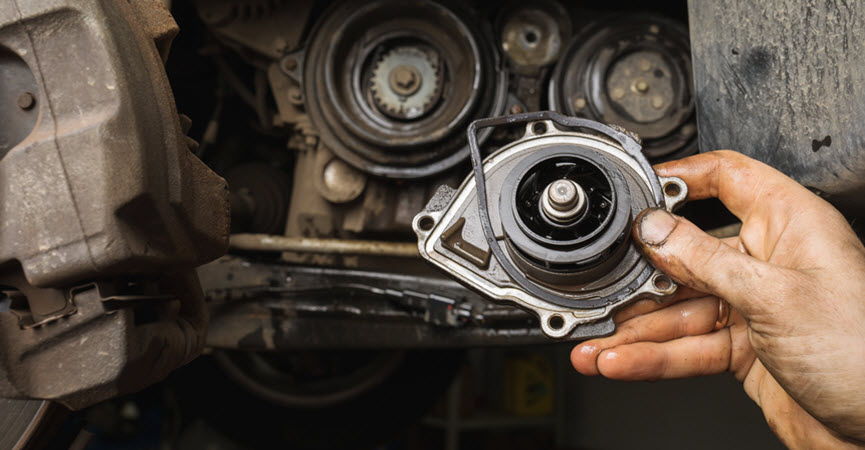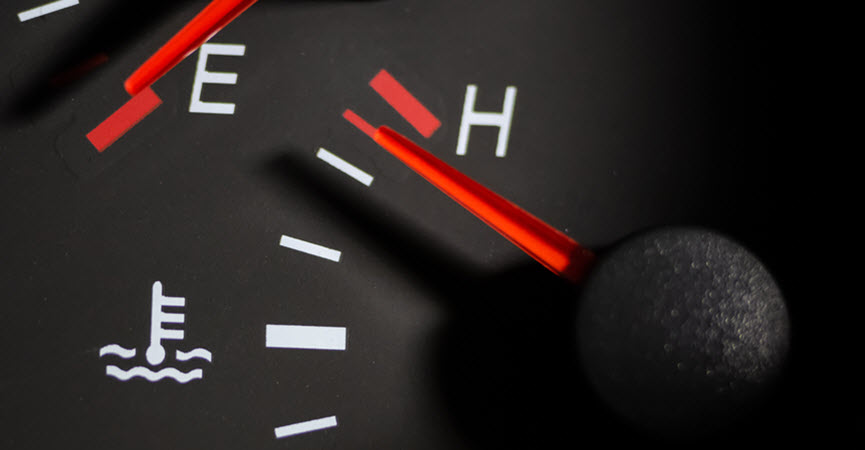The water pump is the heart of a BMW’s cooling system. It circulates the coolant through the engine block, cylinder heads, and radiator. If it fails, your BMW will overheat and cause major (and expensive) damage to the engine. Let’s discuss the functions of the water pump in your BMW, why it may fail and what to do when it fails.
What is the function of the water pump in a BMW?
The water pump is responsible for circulating coolant to keep your engine cool. (Coolant is usually made of antifreeze and water combined.) The pulley on the front of the water pump spins the impeller inside. The impeller is designed to push coolant liquid through the cooling system. As it passes through the system, it absorbs heat from the engine and then returns to the radiator to dissipate that heat.
Like many parts of a BMW, there are two types of water pumps: mechanical and electric. Mechanical pumps have been used for years, but electric pumps are quickly replacing them.
- Mechanical Water Pump: A mechanical water pump has a simple design with an impeller driven by a belt and pulley, usually attached to either the crankshaft or camshaft. As long as the engine is running there will be coolant being pumped throughout the cooling system.
- Electric Water Pump: An electric water pump runs only when needed by using an electric motor instead of a belt. When you start your car and begin driving, an electric signal tells the motor to turn on, which begins pumping coolant throughout the cooling system.
The Most Common Causes of a Water Pump Failure
- Wear and Tear: The most common reason for a water pump failure is due to age/wear. The bearings in the water pump eventually wear out, which causes the shaft and impellers to become loose. The loose pieces then rattle around the inside of the pump and cause damage to the internal components. If you are hearing a rattling or knocking noise coming from your engine bay, it’s a good idea to check your water pump for any signs of damage.
- Poor cooling system maintenance: The cooling system is responsible for circulating coolant through your engine to keep it at the right temperature. It also lubricates the bearings of the timing belt (or chain). It is important to check that this system is working properly without faults, so timely maintenance is necessary.
- Coolant leaks: Coolant is what keeps everything cool in your car’s engine. If you have a leak, this means that there won’t be enough coolant circulating through the system to properly and your engine can overheat. This can cause major damage.
- Worn Seals: Like most pumps, the water pump in your BMW has seals that prevent coolant from leaking out when it is being pumped through the engine block and cylinder heads. As those seals begin to wear out, you may begin to see puddles of coolant underneath your car after it has been parked for any length of time. Eventually, those worn seals will cause your water pump to fail altogether if they are not repaired or replaced on time.
- Coolant contamination: There could be debris floating around in your coolant reservoir and hoses. Dirt can build up on the impeller blades over time and cause clogs, leaks, and thick coolant.
Signs Your BMW Water Pump has Failed
If you notice your engine temperature gauge rising or steam coming out of your hood, pull over immediately and shut off your car. You should then call for a tow as soon as possible. You do not want to drive with an overheating engine, since it can lead to serious damage and expensive repairs.

JCL Automotive can Help
As a leading service center for European auto owners, JCL Automotive prides itself on product knowledge, staff experience, and customer service. Located in Hellertown, PA, our technicians have the skills and product knowledge to work on a variety of European and import vehicle models including your BMW.
Our shop is outfitted for quick, convenient, and affordable maintenance on European brand vehicles. Call us on 484-851-3390 or stop by our shop today, let’s help get your BMW back on the road as soon as possible.

